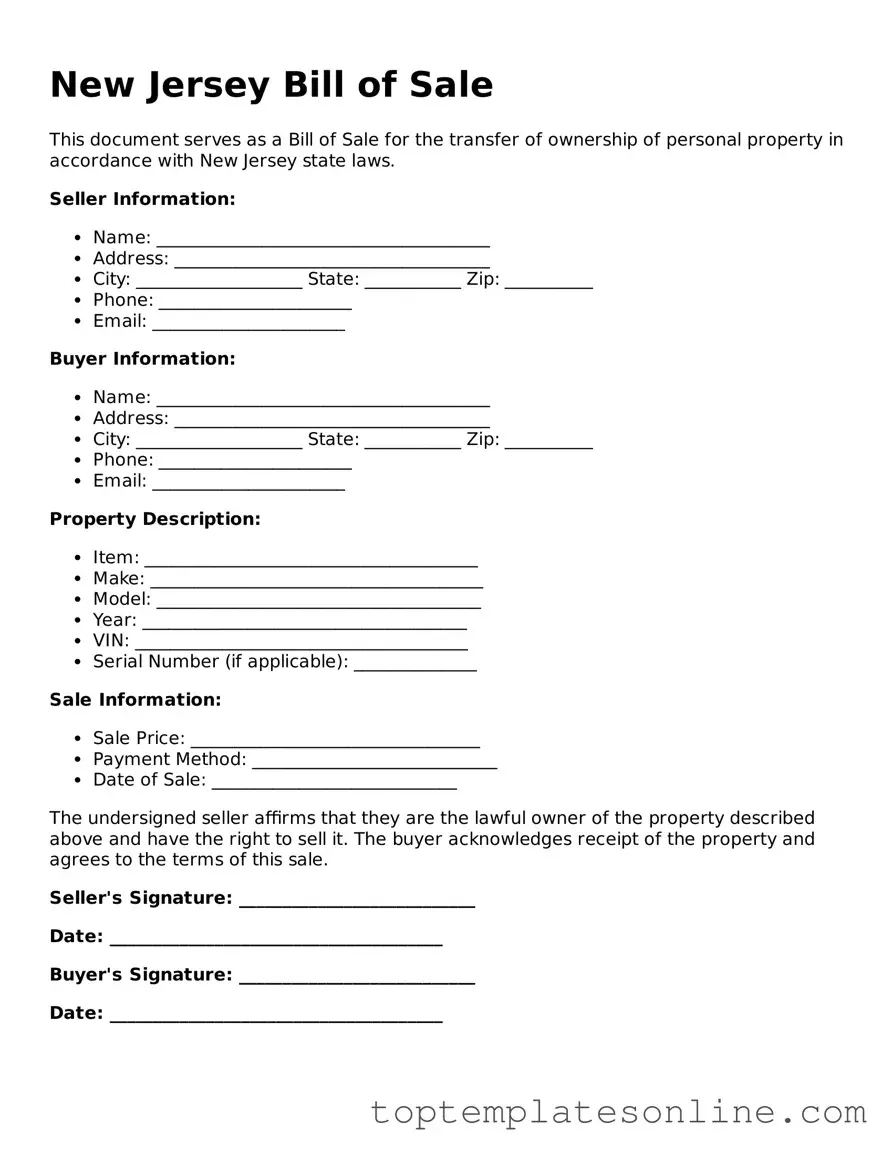Blank Bill of Sale Template for New Jersey State
When it comes to buying or selling personal property in New Jersey, having a Bill of Sale is an essential step in the process. This document serves as a written record of the transaction, providing both the buyer and seller with proof of the exchange. A well-crafted Bill of Sale includes critical details such as the names and addresses of both parties, a description of the item being sold, the sale price, and the date of the transaction. It may also include any warranties or conditions related to the sale. In New Jersey, while a Bill of Sale is not always legally required, it is highly recommended for protecting the interests of both parties involved. By having this form, you can avoid potential disputes in the future and ensure that both parties have a clear understanding of the terms of the sale. Understanding the components of the New Jersey Bill of Sale form can help facilitate a smooth transaction and provide peace of mind for everyone involved.
Some Other State-specific Bill of Sale Templates
What Does Bill of Sale Look Like - A Bill of Sale may be needed for sales involving an auction or estate sale.
A New York Hold Harmless Agreement is a legal document designed to protect one party from liability for certain actions or events. This agreement outlines the responsibilities of the parties involved and can be crucial in various contexts, such as construction projects or rental agreements. Those interested in protecting themselves should consider using the Hold Harmless Agreement form, which helps individuals or businesses agree to assume the risk associated with specific activities, thereby safeguarding others from potential legal claims.
Vehicle Bill of Sale Form - A Bill of Sale ensures that the buyer receives a clear title to the item purchased.
Common mistakes
-
Not including the correct date of the transaction. The date is important for record-keeping.
-
Failing to provide accurate information about the buyer and seller. This includes names and addresses.
-
Leaving out a detailed description of the item being sold. This can lead to confusion later on.
-
Not indicating the purchase price clearly. This should be stated in both numbers and words.
-
Omitting signatures from both parties. A Bill of Sale is not valid without these signatures.
-
Using incorrect or outdated forms. Always ensure you have the most current version of the Bill of Sale.
-
Not including any necessary disclosures about the item. This is especially important for vehicles.
-
Failing to have a witness sign if required. Some transactions may need a witness for validity.
-
Not keeping a copy of the completed Bill of Sale for personal records. This is essential for future reference.
-
Rushing through the form without double-checking for errors. Mistakes can lead to issues down the line.
Guide to Writing New Jersey Bill of Sale
Once you have obtained the New Jersey Bill of Sale form, it is essential to fill it out accurately to ensure a smooth transaction. This document serves as a record of the sale and includes important details about the buyer, seller, and the item being sold. Follow these steps to complete the form correctly.
- Start by entering the date of the sale at the top of the form.
- Provide the full name and address of the seller in the designated section.
- Next, fill in the full name and address of the buyer.
- Describe the item being sold. Include details such as make, model, year, and any identifying numbers, like a Vehicle Identification Number (VIN) for vehicles.
- Indicate the purchase price clearly, ensuring it is accurate and legible.
- Both the seller and buyer should sign and date the form at the bottom. Signatures confirm the agreement between both parties.
- Make copies of the completed Bill of Sale for both the seller and the buyer for their records.
Documents used along the form
The New Jersey Bill of Sale form serves as a crucial document in the transfer of ownership for various items, including vehicles and personal property. Alongside this form, several other documents can enhance the transaction process, providing clarity and legal assurance for both parties involved.
- Title Transfer Document: This document is essential for transferring ownership of a vehicle. It includes information about the previous and new owners and must be completed and submitted to the New Jersey Motor Vehicle Commission.
- Odometer Disclosure Statement: Required for vehicle sales, this statement verifies the mileage of the vehicle at the time of sale. It protects both the buyer and seller from potential disputes regarding the vehicle's condition and value.
- Lease Agreement: A crucial document that outlines the terms between a landlord and tenant, ensuring clarity in the rental process. For templates to help create this document, you can refer to NY Templates.
- Purchase Agreement: This document outlines the terms of the sale, including the purchase price, payment method, and any warranties or conditions. It serves as a comprehensive reference for both parties throughout the transaction.
- Receipt of Payment: A simple yet important document, this receipt confirms that payment has been made. It provides proof of the transaction and can be useful for future reference or in case of disputes.
Utilizing these documents in conjunction with the New Jersey Bill of Sale can help ensure a smooth and transparent transaction. Each form plays a specific role in safeguarding the interests of both the buyer and seller, ultimately contributing to a successful exchange.
